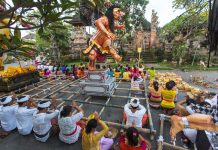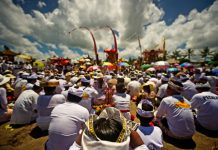The holy month of Ramadan is back again from Fri, Feb 28, 2025 – Sun, Mar 30, 2025. This is probably the most awaited month for Muslims in the world. Muslims will fast for a month before embracing the Lebaran or Eid El Fitr, which is considered as a ‘victory’ after doing good deeds and going away from sinful acts for a month.
If you are a newcomer to Indonesia, or planning to travel to Indonesia during Ramadhan month, there are several things that you need to know as some activities are altered and adjusted according to the fasting timetable and other Muslim’s religious activities.
There are also habits and traditions that Muslims do only during the Ramadhan month. Here are some of the things that you need to know:
- The fast begins in the morning just before sunrise (imsak time), and is broken at maghrib which falls at sunset. Before imsak, Muslims are expected to have a meal (sahur). Usually, neighborhood mosques will call people to get up through the speaker (around 3am to 4am). Groups of young boys or devoted individuals will walk around neighborhoods beating on drums and other noise makers to awaken people, and yell out “sahur, sahur!”. But, don’t tell them to be quiet as this would be offensive.
- The overall pace of life overall slows down. Several governmental and private offices may reduce office hours during Ramadhan. Things take longer to get accomplished both at home and at the office.
- Street food vendors and some restaurants close during the day and some restaurants stop serving alcohol totally, and others only in the evening. Other restaurants still open during the day but they will cover the windows with curtains to respect those who are fasting. The government may order the closing of night entertainment centers during the first day and the last day of Ramadhan (in some cases, those entertainment centers will be closed throughout the month). However, some establishments in 5 star hotels or better known clubs will be allowed to operate, with shortened hours throughout the month.
- There will be many street vendors in certain points of the city that sells foods and drinks near the break-fasting time (around 3 pm to 6 pm). It is usually called “Pasar Ramadhan” or Ramadhan market.
- Food prices and airplane ticket prices may increase dramatically as Lebaran (Idul Fitri) nears. Supermarkets will become extremely busy as people are looking for special treats to break the fast each evening, and especially a week prior to Lebaran as they prepare for the feasts at the end of the fasting month.
- An increased level of patience and tolerance is required when dealing with workers who are fasting.
- Traffic jams from the afternoon rush hour start earlier as many office workers are allowed to leave earlier than usual to get home in time to break the fast with family and friends.
- There is a thing called ngabuburit, a Sundanese term that basically means killing time while waiting for the break-fasting. Usually, people will be taking walks or hanging out in the park, going to Pasar Ramadhan, cooking for break-fasting, and many activities that does not include eating, drinking, or gossiping.
- Dates are among the most desirable fruits during Ramadhan (and it is found in plenty throughout the month!).
- There will be a lot of Bukber or Buka Bersama (break-fasting together) invitations throughout the month. Tables in restaurants are reserved for this activity. It is quite difficult to find the tables without reservations.
- Near the Lebaran date, department stores, clothing stores, jewelry shops, and even traditional markets will be jam-packed. There is a tradition in Indonesia where people will buy new clothes to be worn in Lebaran. Discounts are everywhere! This may not be a perfect time to shop at markets like Tanah Abang, unless you are okay with the crowd.
- You may feel uncomfortable to have a meal or snack before your colleagues who are fasting. But it does not mean that you need to fast as well. Just make sure that you respect each other well, and no problem will appear.
- Around a week prior to Lebaran, people in Indonesia have mudik or pulang kampong tradition; when they will go to their home at the other city to celebrate Lebaran with their big family. You would expect traffic jam on certain roads that connect big city like Jakarta with other smaller cities. Airplane, ships, trains tickets will be fully booked—so if you are planning to travel near Lebaran, make sure you book the tickets as early as possible.
Wishing you peace in this holy month.






